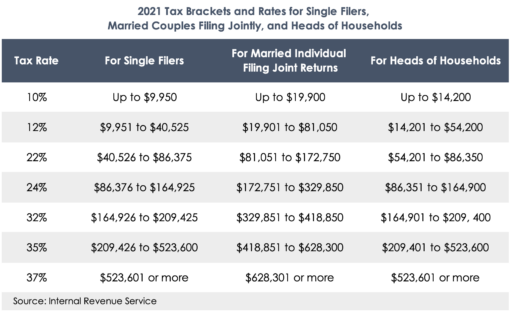Navigating the U.S. tax system is not an easy task – even for experienced tax filers. In addition, continued ripple effects from the COVID-19 pandemic and the government’s unprecedented financial assistance to Americans have resulted in several changes that may impact your 2021 income tax return. Specifically, there are new eligible tax deductions, limits and credits that could help you reduce your tax liability. Below we outline key changes and some basic steps you can take to better prepare to file your personal income tax return.
Child Tax Credit
One of the biggest new tax provisions for families in 2021 is the expanded Child Tax Credit. The Child Tax Credit increased from $2,000 to up to $3,600 for each dependent child under 6 and up to $3,000 for each dependent child from 6 to 17. However, you may see a lower Child Tax Credit when you file your 2021 taxes if you received advance payments (stimulus checks) during 2021. If you received advance payments, you would have received IRS Letter 6419. To qualify for the full credit, single filers need a modified adjusted gross income (AGI) of less than $75,000 and married couples filing together must earn AGI below $150,000.
Expanded Child and Dependent Care Credit
There also are major changes to the Child and Dependent Care Credit for tax year 2021 that are aimed at providing assistance for working parents. If you sent your kids under the age of 13 (no age limit if disabled) to daycare, summer camp or a sports camp so you could work, you may be able to claim an increased Child and Dependent Care Credit of up to $8,000 for two or more kids and up to $4,000 for one child. Under the new provision, the credit is also fully refundable, meaning you can still get the credit even if you don’t owe any taxes.
Taxes on Stimulus Payments
Many U.S. citizens received a stimulus payment that was issued in 2021. This third round of federal financial assistance was issued as part of the American Rescue Plan and featured $1,400 single, $2,800 married filing jointly, and $1,400 per dependent including adult dependents. The stimulus money is not taxable. However, you will need to include the amount you received for the third stimulus on your 2021 taxes when you file. If you received too little money, you can claim more in the form of a Recovery Rebate Credit. If you received too much, you do not have to pay it back.
Qualified Sick and Family Leave Credits
For both self-employed and small business owners who were sick or took care of a family member as a result of COVID in 2021, you may be able to claim the Qualified Sick and Family Leave Credits for the 2021 tax year. The provision also allows you to use prior year net earnings in the calculation of the average daily self-employment income if the prior year’s net earnings show a higher average daily self-employment income.
What if I lived in another state in 2021?
COVID-19 has prompted many people to work remotely and move to another state, either temporarily or permanently. There are some tax implications if you have been living in a different state. Most states will require you to pay taxes outside of your home state if you have resided there for more than 6 months. State tax laws vary depending on the state. Some states, such as Florida, have no personal income tax. It is important to consult your tax advisor to understand the rules for your particular state.
New Tax Brackets

Charitable Deductions
The CARES Act included a financial incentive to encourage charitable giving to help non-profits weather the pandemic. Charitable deductions are usually reserved only for those individuals who file “itemized” tax returns, and this deduction is now available to all filers, even those who take the standard deduction (non-itemized filers). Single filers can deduct $300 to eligible 501I non-profits and $600 for married couples filing jointly.
Common FAQ to help you navigate your 2021 tax return
When is my tax return due?
The deadline to file individual tax returns, and importantly, make any payments for taxes owed for calendar year 2021 is April 15, 2022. Returns must be filed electronically before midnight on that date. If mailing returns and payments, returns must be officially postmarked (date stamped) at a U.S. Post Office no later than April 15th.
Do I need help preparing my taxes?
Tax filings can be complex with new changes every year. For many taxpayers, it is advisable to seek guidance from a trusted accountant or financial advisor.
What documents do I need to provide to my tax preparer?
Generally, the start of a new year comes with a flurry of tax forms that are either mailed or available to download. Individuals need to make sure they are gathering all of the official tax documents on both the income and expense side to support any claims for eligible tax deductions. Some examples to watch for include:
- W-2s: These forms provided by an employer show wages earned and any federal, state and local taxes that have already been paid.
- 1099s: These forms show a variety of income earned from various sources.
- 1099-MISC: These forms show miscellaneous wage income earned, and are commonly used to show payments made to independent contract workers
- 1099-INT and 1099-DIV: These report your interest income and dividend income from bank and investment accounts.
- 1099-S: This form reports any income you may have received through U.S. social security payments.
- K-1s: The K-1 form is used if you have income from a partnership, small business or trust.
- Form 1098 Mortgage Interest Statements: These forms are typically provided by the mortgage company or lender.
- Form 1098-T, Tuition Statement: This form reports tuition expenses you paid for college tuition that might entitle you to an adjustment to income or a tax credit.
- For itemized federal and state tax filers, documentation of other state and local taxes paid, such as property taxes or sales tax on a large purchase, such as a car or boat.
- Payment receipts, credit card statements or check stubs that verify payments for child care or donations made to eligible charitable non-profit organizations.
How long should I keep tax records?
The IRS recommends that individuals keep records for 3 years from the date you filed your original return, or 2 years from the date you paid the tax, whichever is later. In addition, it is advised that you keep records for 7 years if you file a claim for a loss from worthless securities or bad debt deduction.
CanAm Enterprises, with over three decades of experience promoting immigration-linked investments in the US and Canada, has a demonstrated track record of success. With over 60 financed projects and $3 billion in raised EB-5 investments, CanAm has earned a reputation for credibility and trust. To date, CanAm has repaid more than $2.26 billion in EB-5 capital from over 4,530 families. CanAm manages several USCIS-designated regional centers that stretch across multiple states. For more information, please visit www.canamenterprises.com.





